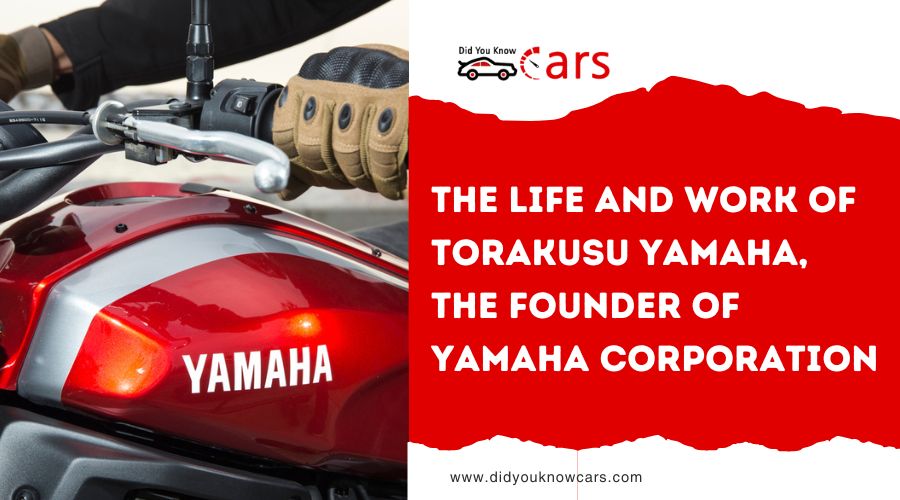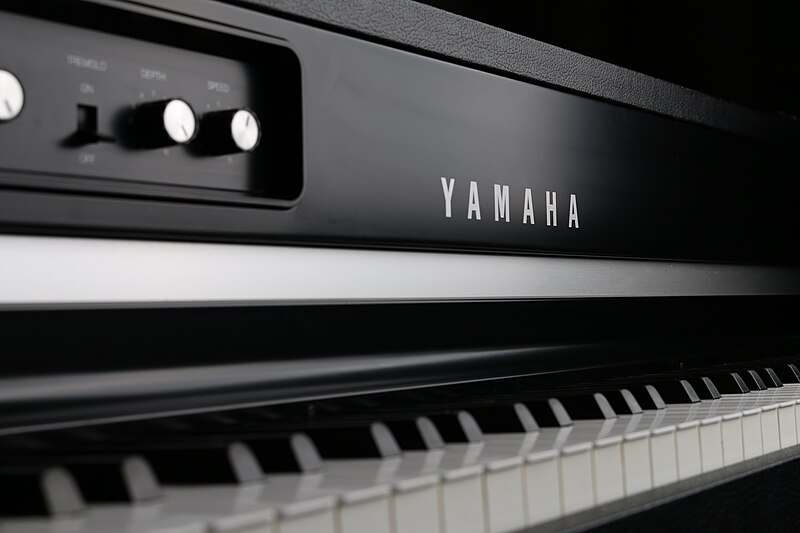We see the brand “Yamaha” among motorcycles, musical instruments, and motorboats, and we know we’re dealing with a quality product. But who’s the man behind this trusted brand?
Torakusu Yamaha, the founder of the Yamaha Corporation, exemplified the spirit of perseverance and innovation, setting the stage for one of the most iconic brands in the world of music and motorcycles. In this blog, let’s explore the life and work of the Japanese visionary.
Early Life and Background
Torakusu Yamaha was born on April 20, 1851, in Wakayama Prefecture, Japan. He’s the third son of Konosuke Yamaha, a samurai warrior from the Kishu-Tokugawa family, the ruling family of the Kishu domain. Konosuke was also an astronomer for the clan, giving Torakusu access to books about astronomy and engineering. As a result, Torakusu became fascinated with technology and machines, besides his interests in kendo and martial arts.
Unlike many of his contemporaries, Torakusu did not receive formal training in engineering or mechanics. Instead, he was largely self-taught, displaying a natural aptitude for understanding and repairing complex mechanical devices. This skill set proved to be invaluable as he embarked on his career.
Growing up in the late Edo period, he was exposed to a Japan that was on the cusp of momentous change. In his twenties, Torakusu Yamaha witnessed a big shift in Japanese society with the Meiji Restoration in 1868. This exciting time brought Western influences and new tech to Japan, and Torakusu was all in.
Early Career
In 1886, when he was 35, Torakusu Yamaha moved to Hamamatsu, aiming to fix medical equipment for a living. But Hamamatsu was pretty small back then, and there wasn’t enough medical equipment to fix a steady income.
So, Torakusu also repaired watches and even worked as a rickshaw man for the boss of a local hospital. In 1871, he headed to Nagasaki and learned the art of watchmaking from an English engineer. Before long, he became an expert at making watches.
One day, Jinjou Elementary School (now Hamamatsu City Motoshiro Elementary School) needed someone to fix their broken American-made reed organ. In a small town like Hamamatsu, finding someone skilled in organ repair was tough, so they asked Torakusu. Despite having no experience in repairing musical instruments, Torakusu took on the challenge. Torakusu took the job and ended up teaching himself all about how organs work.
He found out the issue was just two broken springs and decided to make the springs himself. With some financial help from Toyasaku Fukushima, the hospital director, he started working on it in a tiny workshop, along with a buddy from his medical equipment days. His success in this endeavor led to the realization that there was significant potential in manufacturing Western musical instruments in Japan.
By 1887, just two months into the project, Torakusu and his friend managed to create the first Japanese-made reed organ. But when he showed it off, he got some pretty harsh feedback. Not one to give up, Torakusu moved closer to Tokyo’s music scene. To get his organ to the university there, he even had to carry it a whopping 250 kilometers (160 miles). The people from the university weren’t impressed, saying the organ had some major flaws. But they let Torakusu hang around for a month to learn about music theory. Back in Hamamatsu, he built a second organ, and this time, it was praised as being as good as foreign ones. He even got an order for seven organs, including one for the governor of Shizuoka Prefecture.
Recognizing the growing interest in Western culture and music in Japan, Torakusu began manufacturing organs. By March 1888, Torakusu was using an old temple in Hamamatsu as his organ-making workshop, with local carpenters and cabinet makers pitching in to help.
Establishing Nippon Gakki Co., Ltd.
In 1897, about ten years later, he established Nippon Gakki Co., Ltd. (later renamed Yamaha Corporation), Japan’s first manufacturer of Western musical instruments. His dedication to quality and craftsmanship quickly earned the company a reputation for excellence.
After he got his company up and running, Torakusu Yamaha set up a manufacturing plant with all the latest assembly lines. In 1889, the Minister of Education in Japan asked him to check out how musical instruments were being managed and used in schools. That same year, his company, Nippon Gakki, sold a whopping 250 organs to various schools across Japan. Riding on this wave of success, they started thinking about making pianos, harmonicas, and xylophones.
In 1899, Torakusu took a five-month trip to the USA to check out how big names like W.W. Kimball and Company, Mason and Hamlin, and Steinway work. Thanks to that trip, Nippon Gakki started making upright pianos in 1900 and grand pianos by 1902.
Growth of Yamaha
Over the next few decades, Nippon Gakki started making all sorts of stuff, like boats, home electronics, integrated circuits, and even sporting goods. They opened the first Yamaha Music School in 1954. And then, in 1955, they launched the Yamaha Motor Company, which is famous for its motorcycles. To mark 100 years in business and to give a nod to Torakusu, they renamed the main company Yamaha Corporation in 1987.
In March 1902, Torakusu was awarded the Medal of Honor with Green Ribbon. He also played a big role in local transportation, serving as a director of the Hamamatsu Railway (which later became the Enshu Railway Okuyama Line). In 1911, he was elected to the Hamamatsu City Council and even became the Vice Chairman.
Torakusu taught an 11-year-old apprentice named Koichi Kawai how to make instruments. When Kawai grew up, he started his own company, Kawai Musical Instruments, which eventually became a big rival to Nippon Gakki.
Death
Torakusu Yamaha, the visionary founder of what would become a global corporation, passed away in Tokyo on August 8, 1916, due to an illness. He was 65 years old.
Following Torakusu’s passing, the mantle of leadership at Nippon Gakki was passed on to Chiyomaru Amano, who then held the position of Vice President. Amano took over the role of CEO, continuing the company’s journey and building upon the strong foundation laid by Torakusu.
In 1987, a significant milestone marked the 100th anniversary of the first reed organ built by Torakusu. In a fitting tribute to the company’s founder and his lasting legacy, Nippon Gakki was renamed Yamaha Corporation.
Legacy and Impact of Torakusu Yamaha
Though Torakusu Yamaha left us in 1916, his influence and vision have far outlived him. Today, the Yamaha Corporation stands as a towering testament to his life’s work, evolving into a global powerhouse that touches many aspects of our daily lives.
A Diverse Portfolio
Yamaha Corporation, under the enduring influence of Torakusu’s ethos, has diversified far beyond its initial focus on musical instruments. This expansion includes a remarkable range of products, from sophisticated electronics to high-performance motorcycles. Each product category, while diverse, carries the hallmark of Torakusu’s dedication to innovation and quality.
Pioneering in Electronics and Motorcycles
The company’s foray into the world of electronics and motorcycles has been particularly noteworthy. Yamaha’s electronic products are celebrated for their technological advancements and quality, while Yamaha motorcycles have become synonymous with performance and reliability. These ventures reflect Torakusu’s pioneering spirit, showcasing the company’s ability to adapt and excel in new industries.
A Cultural Icon in Music
In the realm of music, Yamaha’s legacy is especially profound. From grand pianos gracing concert stages to the synthesizers used in modern music production, Yamaha instruments have become integral to the musical landscape. This enduring presence in music is a direct reflection of Torakusu’s original vision of creating instruments of the highest caliber.
Education and Cultural Contributions
Beyond manufacturing, Yamaha has made significant contributions to music education and culture. The establishment of Yamaha Music Schools has helped nurture generations of musicians, spreading the joy of music worldwide. These educational endeavors exemplify the company’s commitment to enriching lives through music, a principle deeply rooted in Torakusu’s own values.
Impact on Global Business and Innovation
Yamaha Corporation’s evolution into a multinational conglomerate also highlights its impact on global business practices and innovation. The company’s growth strategy, centered on Torakusu’s principles of quality and innovation, has been studied and admired by business leaders and academics alike. It serves as a model for how traditional craftsmanship can adapt and thrive in the modern industrial world.
Continuing the Tradition of Excellence
Today, Yamaha continues to uphold the standards set by its founder. The company’s commitment to quality, innovation, and excellence remains as strong as ever, guiding its ventures into new markets and technologies. Torakusu’s legacy is not just in the products and profits but in the unwavering pursuit of excellence that continues to drive Yamaha Corporation forward.
Conclusion
Torakusu Yamaha’s life story is a testament to the power of vision, innovation, and perseverance. From repairing a broken organ to founding a global corporation, his journey is an inspiring tale of how one man’s passion and dedication can have a lasting impact on the world. Yamaha Corporation, under the shadow of its founder’s legacy, continues to set the standard in various industries, echoing Torakusu’s belief in the pursuit of excellence.

